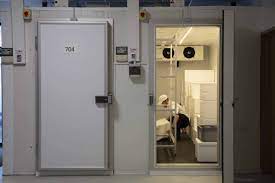Medical refrigeration units play a critical role in storing vaccines, medications, blood products, and other temperature-sensitive items. Proper maintenance and cleaning of these units are essential to ensure that they operate reliably and maintain the required temperature range. Failure to maintain and clean these units can lead to system malfunctions, temperature fluctuations, and even equipment failure, which can result in compromised patient safety and costly losses of valuable inventory. Additionally, an improperly maintained unit may use more energy, leading to increased energy costs and potentially contributing to environmental issues. Therefore, healthcare providers must be aware of the importance of proper maintenance and cleaning of medical refrigeration units to ensure patient safety, prevent inventory loss, and reduce operating costs.
Maintenance of Medical Refrigeration Units
Routine maintenance of medical refrigeration units is critical for ensuring that the units are functioning optimally and are capable of maintaining the required temperature range. Proper maintenance also extends the lifespan of the unit and minimizes the risk of equipment failure. Some routine maintenance requirements for medical refrigeration units include checking the unit’s temperature, inspecting and cleaning the condenser coils, replacing worn or damaged gaskets, and replacing any faulty components.
Improper maintenance of medical refrigeration units can result in temperature fluctuations, equipment failure, and compromised patient safety. A poorly maintained unit may also consume more energy, leading to higher energy costs and potentially contributing to environmental issues.
Strategies for routine maintenance of medical refrigeration units include developing a maintenance schedule and ensuring that it is followed consistently. Regular cleaning and inspection of the unit’s components, including condenser coils, gaskets, and doors, are essential. Additionally, staff should be trained to identify and report any signs of equipment malfunction, such as temperature fluctuations or unusual noises. This proactive approach helps to prevent system failures and minimize downtime.
It is also crucial to have a qualified technician perform regular inspections and maintenance on the unit to ensure that it is functioning optimally. These inspections should include checking the compressor, condenser, and evaporator for proper operation and ensuring that the unit is maintaining the required temperature range. Any issues that are identified during these inspections should be addressed promptly to prevent more extensive equipment failure.
Cleaning of Medical Refrigeration Units
Proper cleaning of medical refrigeration units is critical to prevent contamination of the stored items and to maintain the integrity of the unit. Failure to clean the unit regularly can lead to the accumulation of dust, debris, and other contaminants, which can compromise the unit’s cooling capacity and increase the risk of temperature excursions.
To ensure proper cleaning of medical refrigeration units, it is important to follow these strategies:
- Use a mild detergent or cleaning solution to clean the interior and exterior of the unit.
- Rinse the unit thoroughly with water to remove any residual cleaning solution.
- Dry the unit with a clean, lint-free cloth.
- Clean the condenser coils to remove dust and debris.
- Clean the evaporator coils to remove any frost buildup.
- Clean the gaskets to ensure a tight seal.
- It is recommended to perform a deep cleaning of the unit at least once a year, or more frequently if the unit is located in a particularly dusty or dirty environment.
Best Practices for Maintaining and Cleaning Medical Refrigeration Units
Proper maintenance and cleaning of medical refrigeration units are essential for ensuring the safety and efficacy of stored medical items. Here are some best practices for maintaining and cleaning medical refrigeration units:
a) Routine maintenance:
- Conduct regular inspections of the unit to check for any signs of wear and tear, leaks, or damage.
- Replace any damaged or worn parts promptly.
- Ensure that the unit is level and stable.
- Regularly check and clean the condenser coils, as dirty coils can lead to poor performance and increased energy consumption.
- Verify and calibrate the temperature controls regularly.
- Check and replace air filters if necessary.
b) Cleaning:
- Clean the interior of the unit regularly, following the manufacturer’s guidelines and using approved cleaning solutions.
- Use warm water and mild detergent to clean shelves, drawers, and other removable parts.
- Avoid using abrasive cleaners or sharp objects that could damage the unit’s surfaces.
- Dry the unit thoroughly before returning the shelves and drawers.
- Don’t forget to clean the exterior of the unit, as well.
c)Regular inspections and documentation:
- Conduct regular inspections and document them properly.
- Keep a record of all maintenance and cleaning activities, including the date, nature of the activity, and the person responsible for it.
- Store all records in a safe and secure location.
Compliance and Record Keeping
Medical refrigeration units are subject to regulatory requirements, and compliance is essential to ensure the safety and efficacy of stored medical items. Here are some considerations for compliance and record-keeping:
- Regularly review regulatory requirements and ensure compliance with them.
- Keep a record of all regulatory inspections and any follow-up actions required.
- Maintain records of all maintenance and cleaning activities, including calibration and temperature monitoring.
- Make sure that all records are complete, accurate, and up-to-date.
- Store all records in a safe and secure location.
- Ensure that all staff members are trained on proper maintenance and cleaning procedures, as well as regulatory requirements.
Conclusion:
Proper maintenance and cleaning of medical refrigeration units is crucial to ensure their optimal performance and reliability. Failure to do so can lead to various negative consequences, such as equipment malfunction, product spoilage, and compromise of patient safety. By following best practices for maintenance and cleaning, medical facilities can prolong the life of their refrigeration units and maintain the efficacy of the products stored within. It is also important to comply with regulatory requirements and maintain accurate record-keeping to demonstrate compliance and identify areas for improvement.








